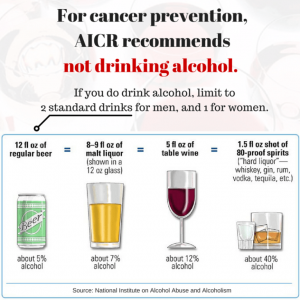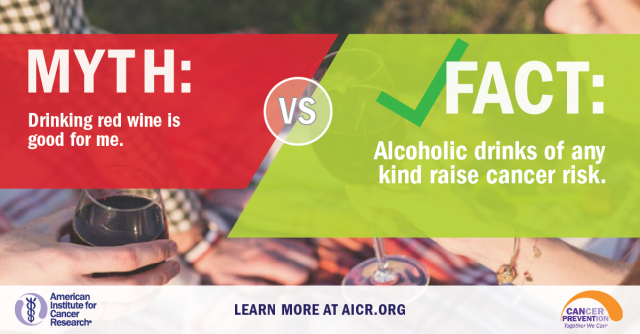Updated April 19, 2022
Many choices you make to lower the risk of cancer pack an extra health-protective punch because they also lower the risk of heart disease. But trying to make a smart choice about alcohol can be confusing.
Alcohol – especially wine – has an image as a heart-healthy choice, and fewer than 4 in 10 people are aware that alcohol poses a cancer risk. But it does, and the link should be of special concern to women since increased breast cancer risk starts at relatively low amounts of alcohol.
 Guidelines focused on heart health emphasize that you should not drink alcohol specifically in hopes of cardiovascular benefits.
Guidelines focused on heart health emphasize that you should not drink alcohol specifically in hopes of cardiovascular benefits.
Alcohol’s Link to Cancer Risk
The evidence is stronger than ever linking alcohol to increased risk of breast cancer. In the U.S., one standard drink is defined as one providing 14 grams of pure alcohol (ethanol). That is equivalent to 5 ounces of wine, 12 ounces of beer or a 1 ½-ounce shot of 80-proof liquor. Just 10 grams of pure alcohol consumed daily raises the risk of premenopausal breast cancer 5 percent, and the risk of postmenopausal breast cancer 9 percent.
While the risk of breast and esophageal cancers increases at even low levels of consumption, alcohol beyond moderation also raises the risk of cancers of the colorectum, stomach, liver, mouth, pharynx, and larynx.
Increased circulating estrogen seems to be an important reason for alcohol’s link to breast cancer, and explains why the risk of Estrogen Receptor-positive breast cancer (the most common form) particularly rises with alcohol consumption. Women often ask about whether certain foods may be “estrogenic,” yet completely overlook this effect of alcohol.
DNA damage can occur from the free radicals formed as alcohol is metabolized, forming acetaldehyde, a recognized carcinogen. Alcohol may also act as a solvent, increasing other carcinogens’ ability to damage cells.
 Heart Health and Alcohol
Heart Health and Alcohol
In observational studies that follow large groups of people for many years, those who drink moderate amounts of alcohol have a lower risk of heart disease compared to people who drink large amounts and compared to those who don’t drink alcohol. However, in observational studies like these, which can’t establish cause-and-effect, some of the people with little or no alcohol consumption are people who have health problems that led them to avoid alcohol.
A closer look shows that alcohol actually stands on a thin line when it comes to heart health: Blood triglyceride levels can rise with too much alcohol. People often focus on potential benefit in reports that alcohol can raise HDL (“good”) cholesterol. However, high blood triglycerides raise heart disease risk, and too much alcohol can send these up.
Blood pressure may rise with excessive alcohol. For most people, one to two drinks a day don’t pose a problem for blood pressure, but drinking more than two or three standard drinks a day can raise it. Healthy blood pressure plays an enormous role in heart health, so if you are having trouble keeping yours under control, discuss with your healthcare provider whether you should try reducing alcohol. Each standard size alcoholic drink contains at least 100 to 150 calories from the alcoholic beverage itself, and mixers in cocktails can add even more. Many people find that after a drink or two, they are less likely to withstand impulses to indulge in foods or portion sizes that they would normally be more cautious about limiting, leading to a further increase in calorie consumption.
Binge drinking is not moderate drinking, regardless of whether it “averages out” over the course of a week to the same total amount of alcohol defined as moderate drinking. Binge drinking raises risk of heart disease.
Finding Common Ground
What is moderate drinking? The same amount of alcohol poses more risk for women because differences in alcohol-metabolizing enzymes and total body water make alcohol more concentrated in the blood and more slowly eliminated.
The same concerns seem to apply to older adults of both genders. Binge drinking is not moderate drinking, regardless of whether it “averages out” over the course of a week to the same total amount of alcohol defined as moderate drinking. Binge drinking raises the risk of heart disease.
Despite some differences in how alcohol affects the risk of heart disease and cancer, there is agreement about a commonsense approach. Guidelines focused on heart health emphasize that you should not drink alcohol specifically in hopes of cardiovascular benefits.
Whether focused on heart health or lower cancer risk, recommendations agree that for those who choose to drink, it is best if women limit themselves to no more than one alcoholic drink per day, and men to no more than two.






 Heart Health and Alcohol
Heart Health and Alcohol
I believe the oncology profession should let women with ER positive breast cancer know about the risks of drinking alcohol and recurrence voluntarily (we should not have to ask). More awareness on this subject is needed.
They do, there is substantial evidence shared with cancer victims that have ER or PR positive breast cancer. People still believe that red wine drinking is safe when the evidence shows a very different picture.
When are alcohol bottles going to be labeled that alcohol causes cancer??! We did it for cigarettes why not for alcohol? Are the alcohol lobbyists that strong that it’s being kept off the bottles and labeling? every commercial that sells alcohol should have a runner across the bottom of the screen that says alcohol causes cancer! How do we get through to our own family members ? Mine lectures on eating healthy while they are drinking down the Alcohol! It sure doesn’t make sense to me! But how to help these people when they turn their backs on the statistics?
I was diagnosed with ER+ breast cancer in 2004 and then again in 2016. I refused to stop drinking alcohol after the 1st dx. With the 2nd dx I quit alcohol for good. The best thing I ever did for my health.
I never heard that alcohol (even red wine) was associated with cancer. Liver disease, yes. Cancer, no. There definitely needs to be information distributed to the public.